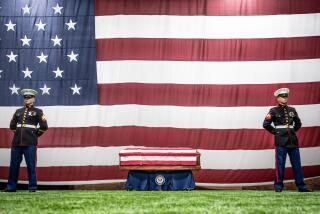Army Sgt. Ian T.D. Gelig, 25, Stevenson Ranch; killed by suicide bomber in Afghanistan
- Share via
Army Sgt. Ian T.D. Gelig was so popular in his Stevenson Ranch neighborhood that whenever the paratrooper returned home on leave, his two sisters would keep his visits secret for a while.
“We wouldn’t tell people he was here because we wanted to hang out with him,” said his younger sister, Vanessa, 21, who was sitting in the family living room, photographs of her brother adorning the walls and tabletops.
“Otherwise, everybody would be coming over. He had this way with people. Everybody was always saying, ‘He’s my best friend.’ ”
Gelig, 25, was killed March 1 when a suicide bomber drove into his convoy in southern Afghanistan’s Kandahar province, on the Pakistani border.
He was an armored-vehicle driver assigned to the 782nd Brigade Support Battalion, 4th Brigade Combat Team, 82nd Airborne Division at Ft. Bragg, N.C.
On the day he died, Gelig took the more exposed position of gunner to fill in for a sick comrade. Among his many awards and decorations was the Bronze Star.
Remembered both for his quiet spirituality and gregarious sense of humor, Gelig died with rosary beads in his pocket and dreams of following his mother and father into the nursing profession when his Army hitch was up.
His gift for coaxing smiles from frowns would have been ideal for nursing, Gelig’s loved ones say.
“He was the funniest, goofiest person,” said his older sister, Liana, 24.
Army Spc. Larry Le, who served alongside Gelig for nearly three years, recalled the time when their unit was given a punishment detail because a soldier had misplaced his tools during a mission in Afghanistan.
“Everybody was in a bad mood, but Ian just kept making jokes to keep us laughing,” Le, 23, said during a memorial birthday party for his fallen buddy at the Gelig home in October. The celebration, which packed the house, included a Roman Catholic Mass in the backyard.
“There is no word that could do him justice,” Le said after the final prayer. “When he was gone, everything was different. I pretty much shut down all emotions for a long time.”
Joining Le at the party were two other specialists from the 82nd Airborne Division, Boris Lorezca and Mark Jay. They became close to Gelig about a year before he died.
“He was just a very kind person, always volunteering to help with anything,” said Lorezca, 23.
Jay nodded, saying, “He could make everybody come together.” The 27-year-old wagged a finger between himself and Lorezca. “Look at us — he brought us together. We became friends through him.”
Gelig was born in the Philippines and grew up in Arleta and Stevenson Ranch, developing passions for basketball, writing, the saxophone, rap and alternative punk.
Along the way, he acquired a legion of friends to complement the circle of cousins who were his constant companions. He was a 2002 graduate of Hart High School.
His parents, Tim and Delia Gelig, were too grief-stricken to give interviews in the weeks and months after his death, even when several thousand people lined the streets of Santa Clarita for a flag-waving parade that shepherded him to his final resting place at the San Fernando Mission Cemetery. The funeral drew more than 400 mourners.
Gelig’s parents said their son had emerged from his teen years seeking independence. He took classes at College of the Canyons and held a few odd jobs, but he saw the Army as an opportunity to strike out on his own. He enlisted in 2006, initially against their wishes.
“He wanted to find himself,” his father said. “When he decided, I just supported him.”
Military service is a tradition in the family. Tim Gelig’s father and grandfather had worn the uniform, as had his wife’s father and brother. Ian Gelig signed up around the same time as two cousins and a young uncle.
Another Gelig tradition is to prize a male heir, to carry on the paternal name, family members said. As a lone son, Ian would tease his parents by telling them, “I am the only hope.”
“He’d sign his letters with ‘The Only Hope,’ ” his mother said, blinking back tears.
When Gelig completed his basic training at Ft. Sill, Okla., his family flew there to celebrate with him. After he shipped overseas, his mother said, they prayed for him day and night, sometimes at the simple altar that graces a niche inside their front door.
Gelig spent 15 months in Kuwait and Iraq before returning to his base at Ft. Bragg. His parents said he was then deployed to Afghanistan and his active-duty service was involuntarily extended under the military’s “stop-loss” policy, a measure used to maintain combat troop strengths.
“He was excited about getting back home, to get into nursing,” his mother said. “But he was very proud to be in the military.”
And he knew the dangers going in. The day he departed for boot camp, he left a letter on his pillow in which he prepared his family for the possibility that he would not survive a combat assignment.
“The letter was a prophecy,” said his father, who slumped on the sofa, leaning against his younger daughter’s shoulder.
His wife’s tears were flowing now. “My son knew something was going to happen to him,” she said, surrounded by the photos of him that seem to fill the house, many in poster montages assembled by his sisters and friends.
“He left the letter to say goodbye.”
More to Read
Sign up for Essential California
The most important California stories and recommendations in your inbox every morning.
You may occasionally receive promotional content from the Los Angeles Times.














